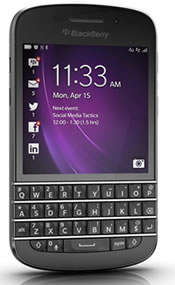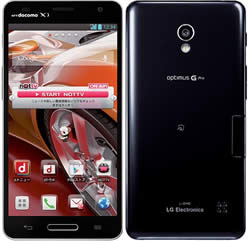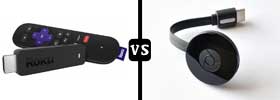Difference between Blackberry Q10 and LG Optimus G Pro
Key Difference: The BlackBerry Q10 has a 3.1-inch AMOLED capacitive touchscreen that allows users to access data using touch and weighs approx 139 grams. Below the screen, there is a full QWERTY keyboard that is similar to those found on the old BlackBerrys. The device is powered by 1.5 GHz Cortex-A9 Dual-core TI OMAP 4470 processor and PowerVR SGX544 GPU. LG Optimus G Pro has major updates to its predecessor, the LG Optimus G. The device sports a massive 5.5-inch True Full HD IPS touch screen with multi-touch capability and a pixel density of 401 ppi. Under the hood, the phone is powered by 1.7 GHz Quad-core Snapdragon 600, making it pretty fast and speedy.
 Blackberry added a new phone, Q10, to its growing line-up that is aimed at the original users as it features a full QWERTY keyboard. Separating themselves from the full-touch smartphones, the company is trying to garner attention among the users that do not have time to play with touchscreen and require keyboard for typing. However, fret not; the device is also has touch capability on its screen.
Blackberry added a new phone, Q10, to its growing line-up that is aimed at the original users as it features a full QWERTY keyboard. Separating themselves from the full-touch smartphones, the company is trying to garner attention among the users that do not have time to play with touchscreen and require keyboard for typing. However, fret not; the device is also has touch capability on its screen.
The BlackBerry Q10 has a 3.1-inch AMOLED capacitive touchscreen that allows users to access data using touch and weighs approx 139 grams. Below the screen, there is a full QWERTY keyboard that is similar to those found on the old BlackBerrys. The phone has a custom glass-weave black panel that can be popped off to access the battery, SIM and microSD card slots. The USB and the charging port can be found on the left side of the device, while the right side has the volume rocker and a middle button for play/pause and quickly toggling vibration mode. The Power button is placed at the top of the screen, while the mic and the loudspeaker are placed on the bottom of the device. The back of the device has the camera and the flash, which is separated from the removable back by a metal band.
The device is powered by 1.5 GHz Cortex-A9 Dual-core TI OMAP 4470 processor and PowerVR SGX544 GPU. The device comes with 2 GB RAM, 16 GB of internal storage system that can be expanded by 64 GB via SD card. The device comes with an 8MP primary camera and a 2MP secondary camera. The primary camera comes with multiple features such as 5-element F2.2 lens, Dedicated ISP (image signal processor) with 64MB frame buffer, Enhanced Super Resolution Digital Zoom (5x), 4 DOF (Degrees of freedom) video stabilization, Hybrid absorptive IR filter and Time Shift.
The company has also incorporated the features and apps that are found in the Z10 including The Hub, which is a screen that is available by swiping left after the first menu page and task switcher and it is creates a single point where the user can check all updates from SMS, e-mail to facebook notifications. The phone also comes with Blackberry Balance that allows users to create multiple profiles on their phone separating their professional life from their personal life. Other included features also include LED Indicator, BlackBerry Story Maker, Universal Search, already loaded Blackberry Apps and other apps such as Facebook, Twitter, LinkedIn, etc. The phone houses a 2100 mAH removable battery.
 The LG Optimus G Pro is the successor to the original LG Optimus G and resembles the Samsung Galaxy Note II in size and features. The phone has already been announced and launched in Korea, with launch date yet to be released for the rest of the world.
The LG Optimus G Pro is the successor to the original LG Optimus G and resembles the Samsung Galaxy Note II in size and features. The phone has already been announced and launched in Korea, with launch date yet to be released for the rest of the world.
The LG Optimus G Pro has major updates to its predecessor, the LG Optimus G. The device sports a massive 5.5-inch True Full HD IPS touch screen with multi-touch capability and a pixel density of 401 ppi. The screen is truly amazing in viewing and the bigger screen is perfect for multi-purpose use (things people usually whip out their tablets or laptops for). The high resolution ensures crisp and sharp images, while the phone has great viewing angles. The large screen also ensures that the device is hard to hold and function with one hand. The G Pro has a sleek plastic chassis, which makes it a slippery when trying to maneuver single-handedly. However, the plastic chassis does not make the phone weak; in fact it is very resilient. LG has made it a bit easier by placing the power and the volume buttons on the right side of the device, rather than placing the power button on the top. Operating the phone requires the person holds the phone in one hand and operates using the other.
Under the hood, the phone is powered by 1.7 GHz Quad-core Snapdragon 600, making it pretty fast and speedy. The device can handle running multiple operations as well as high-res games, without major glitches. The device offers internal memory capacity of 32 GB, which can be expanded further using the microSD slot by 64 GB. The device provides 2 GB worth of RAM, decreasing the lagging effect when running too many apps. The device comes with an NFC, Infrared port, USB and Wi-Fi hotspot capability. The Infrared port ensures that the phone can be made into a remote for any supporting device, while the hot-spot allows the person to share internet with others.
The device houses a 13 MP primary camera for picture taking that supports 4208 x 3120 pixels, and a 2.1 MP secondary camera for video conferencing or calls. The camera is pretty decent in terms of taking hi-res, sharp photos, however, according to The Verge review; the camera has a tendency of washing out colors from the images. The huge viewfinder on the device is great for taking images. Both the cameras have the ability to take videos at 1080p@30fps. One pretty nifty feature on the phone is the Dual-recording feature (similar to the one on the S4), which allows the user to record videos simultaneously from both of the camera. Another feature that is boasted by the company is the Virtual Reality Panorama shot that allows the user to take images and stitch them together for 360 degree panorama shots (this feature is very similar to the Photo Shoot on the Nexus 4).
The device houses a massive Li-Po 3140 mAh battery that is removable, a must feature for many smartphone lovers. The company has yet to release the official data about the Talktime and the Stand-by time offered by the phone. LG has also added the QSlide apps and the QButton feature on the phone. The QSlide apps are widgets that allow the user to do multiple jobs on the same screen, such as take notes, see the calendar, check e-mail and can also allow the user to watch a video and text at the same time. A similar feature is available in the Note II, but it the system only allows the user to access limited apps on the phone. The QButton located on the left side of the device allows the user to access any apps on the phone by pressing the button. The device is yet to hit other shores and prices will also be announced accordingly with the release dates.
The information for the detailed table about the two phones has been taken from the Blackberry website, theverge.com, engadget.com and GSMArena.com.
|
|
Blackberry Q10 |
LG Optimus G Pro |
|
Launch Date |
April 2013 |
Q2/2013 |
|
Company |
Research In Motion |
LG |
|
Size |
119.6 x 66.8 x 10.4 mm |
150.2 x 76.1 x 9.4 mm |
|
Display |
3.1-inch Super AMOLED capacitive touchscreen |
5.5 inches True Full HD IPS Plus LCD capacitive touchscreen |
|
Screen |
720 x 720 pixels (~328 ppi pixel density), 16M colors |
1080 x 1920 pixels (~401 ppi pixel density) |
|
Protection |
- |
N/A |
|
Weight |
139 grams |
172 grams |
|
2G Network |
GSM 850 / 900 / 1800 / 1900 - all versions CDMA 800 / 1900 - SQN100-2, SQN100-4 |
GSM 850 / 900 / 1800 / 1900 |
|
3G Network |
HSDPA 850 / 1900 / 2100 - SQN100-1 HSDPA 850 / 900 / 1900 / 2100 - SQN100-2, SQN100-3, SQN100-4 HSDPA 850 / 1700 / 1900 / 2100 - SQN100-5 |
HSDPA 900 / 2100 |
|
4G Network |
LTE 700 / 850 / 1700 / 1900 - SQN100-1, SQN100-5 LTE 700 / 1700 - SQN100-2 LTE 800 / 900 / 1800 / 2600 - SQN100-3 LTE 1900 - SQN100-4 |
Depends on market availability |
|
GUI |
BlackBerry Flow user interface |
LG Optimus UI |
|
CPU speed |
1.5 GHz Cortex-A9 Dual-core |
1.7 GHz Quad-core Snapdragon 600 |
|
GPU |
PowerVR SGX544 |
Adreno 320 |
|
OS |
BlackBerry 10 OS |
Android v4.1.2 (Jelly Bean) |
|
Chipset |
TI OMAP 4470 |
Qualcomm APQ8064T Snapdragon 600 |
|
RAM |
2GB |
2 GB |
|
SIM Size |
mircoSIM |
microSIM |
|
Internal Memory |
16 GB |
32 GB |
|
Expandable Memory |
Up to 64 GB |
Up to 64 GB |
|
Sensors |
Accelerometer, Magnetometer, Proximity sensor, Gyroscope, Ambient light sensor |
Accelerometer, gyro, proximity, compass |
|
Connectivity |
2G, 3G, 4G, Wi-Fi, Bluetooth, GPS, NFC, Wi-Fi hotspot |
2G, 3G, 4G, Wi-Fi, Bluetooth, NFC, Infrared port, DLNA, Wi-Fi hotspot, USB, USB Host. |
|
Data |
GPRS, EDGE, WLAN, Bluetooth, NFC, USB |
GPRS, EDGE, WLAN, Bluetooth, NFC, Infrared port, USB. |
|
Speed |
EV-DO Rev. A, up to 3.1 Mbps, HSPA, LTE (market dependent) |
HSDPA, HSUPA, LTE |
|
WLAN |
Wi-Fi 802.11 a/b/g/n, dual band, Wi-Fi hotspot |
Wi-Fi 802.11 a/b/g/n/ac, dual-band, Wi-Fi Direct, DLNA, Wi-Fi hotspot |
|
Bluetooth |
Bluetooth v4.0 with A2DP |
Bluetooth v4.0 with A2DP |
|
USB |
microUSB v2.0 |
microUSB v2.0 (MHL), USB Host |
|
Primary Camera |
8MP 3264 x 2448 pixels |
13 MP, 4208 x 3120 pixels |
|
Secondary Camera |
2MP |
2.1 MP, 1080p@30fps |
|
Video |
1080p@30fps |
1080p@30fps Dual-video recording HDR |
|
Camera Features |
|
|
|
Sound Enhancement |
- |
Dolby mobile sound enhancement |
|
Audio supported formats |
3GP, 3GP2, MP4, WMA, MP3, MKA, AAC, AMR, AWB, OGG, FLAC |
MP3/ WMA/ WAV/ FLAC/ eAAC+/ AC3 player |
|
Video supported formats |
M4A, M4V, MOV, MKV, MPEG-4, AVI, ASF, WMV, F4V, WAV, MP2PS, MP2TS |
MP4/ H.264/ H.263/ WMV/ DviX player |
|
Battery Capacity |
2100 mAH removable battery |
Removable Li-Po 3140 mAh |
|
Talktime |
3G: 13.5 hours |
No official data released |
|
Standby Time |
3G: 14.8 days |
No official data released |
|
Available Colors |
Black, White |
Black, White |
|
Messaging |
SMS, MMS, Email, Push Email, IM, BBM 6 |
SMS(threaded view), MMS, Email, Push Mail, IM, RSS |
|
Browser |
HTML5 |
HTML5, Adobe Flash |
|
Radio |
TBA |
Stereo FM radio with RDS |
|
GPS |
Assisted, Autonomous and Simultaneous GPS Preloaded with BlackBerry Maps application GLONASS support |
GPS with A-GPS support and GLONASS |
|
Java |
MIDP 2.1 |
Java MIDP emulator |
|
Additional Features |
|
|
Image Courtesy: us.blackberry.com, engadget.com









Add new comment